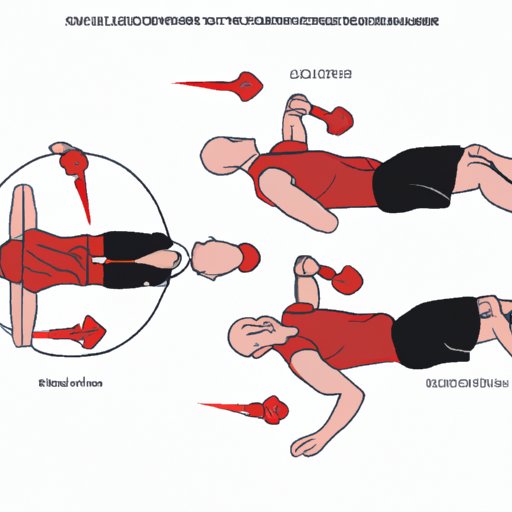
I. Introduction
The skullcrusher exercise, also known as the lying triceps extension, is an effective way to target and strengthen the triceps muscle. It’s a popular exercise in many upper body workouts and is great for those looking to develop a stronger and more toned upper body. In this article, we’ll go over the steps to properly perform a skullcrusher, variations of the exercise, and tips for avoiding common mistakes.
II. Step-by-Step Guide
The first step in performing a skullcrusher is to lie down on a bench and grab a barbell with an overhand grip. Your elbows should be pointed towards the ceiling, with your arms straight up. Make sure to have a spotter or use a lighter weight if you’re a beginner.
Next, lower the barbell towards your forehead by bending at the elbows, keeping your upper arms stationary. Once the barbell is just above your forehead, extend your arms to lift the weight back up towards the ceiling.
It’s important to keep your elbows stationary throughout the movement, as well as to contract your triceps while extending your arms. Aim to perform 3-4 sets of 8-12 reps per set.
If using a barbell proves to be too difficult, try using dumbbells instead. Hold the dumbbells with an overhand grip, and perform the same motion of lowering the dumbbells towards your forehead before lifting them back up.
Remember to start with a lighter weight and increase weight gradually as you progress.
III. Benefits and Variations
One of the main benefits of the skullcrusher exercise is its ability to strengthen the triceps muscle, which can lead to greater upper body strength overall. Additionally, the exercise can be performed in a variety of variations that target different muscle groups and intensities.
One variation of the skullcrusher is the dumbbell variation, which can be performed using both arms at the same time or alternate arms. This variation helps to isolate each arm and can increase strength in each individual arm.
Another variation is the close-grip variation, which involves holding the barbell with hands closer together- approximately shoulder width apart. This variation targets the triceps muscle even more and isolates the muscle for better results.
Finally, the decline variation can be used to add extra resistance and intensity. Lie on a decline bench and perform the skullcrusher as usual, but the added decline makes the movement more challenging.
IV. Common Mistakes to Avoid
One of the biggest mistakes beginners make when performing the skullcrusher is arching their back while lowering the weight. To avoid this, keep your lower back flat on the bench throughout the movement.
Another common mistake is to allow your elbows to flare outwards while lowering the weight. Maintaining a straight elbow will keep the focus on the triceps. It’s also important to keep your wrists straight while holding the weight, to avoid wrist pain.
If you’re unsure about how to perform the exercise correctly, seek help from a personal trainer or fitness professional.
V. Muscle Group Focus
The skullcrusher is particularly effective for targeting the triceps, but it can also work the deltoids and upper pectorals as secondary muscle groups. Pairing the skullcrusher with other exercises such as pushups or bicep curls can provide a well-rounded workout for the upper body.
For those looking to target specific muscles, variations such as the close-grip skullcrusher are especially effective for isolating the triceps muscle.
VI. Exercises to Add to Your Routine
The skullcrusher can fit into a larger workout routine by pairing it with other exercises such as pushups or bicep curls. Upper body workouts can be tailored to target specific muscle groups, and including the skullcrusher can help to strengthen and tone the triceps muscle.
Alternatively, the skullcrusher can be paired with leg exercises such as squats or lunges to provide a well-rounded full-body workout.
VII. Conclusion
The skullcrusher exercise is a great way to target and strengthen the triceps muscle, which can lead to greater upper body strength overall. With this step-by-step guide, you’ll be able to perform the exercise safely and effectively, while avoiding common mistakes that beginners tend to make. Try out different variations of the exercise to find what works best for you and remember to pair it with other exercises to create a well-rounded workout routine.





